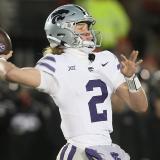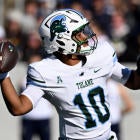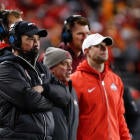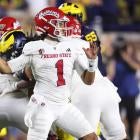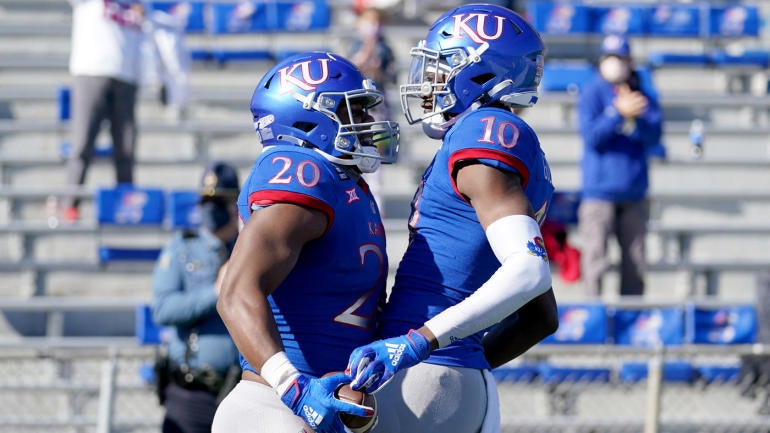
In 2009, after Mark Mangino -- the most successful Kansas football coach since Doc Kennedy in the early 20th century -- resigned from his position, the university hired former Nebraska quarterback Turner Gill to run the program. It was a hire that excited me because I thought that, even though he hadn't done it at Buffalo, Gill might choose to run the option in Lawrence. Had I been working at CBSSports.com at the time, I probably would have written a column about it. Gill opted not to and was fired after going 5-19 over two seasons, including 1-16 in the conference.
With the Jayhawks back on the coaching market before the 2012 season, I once again told anybody who would listen -- the people clamor for Kansas football opinions -- that Kansas should run the option. Kansas did not listen to me this time, either, as it instead opted for a decided schematic advantage with Charlie Weis. Weis was fired four games into his third season, leaving Lawrence with a record of 6-22, including a 1-18 mark in the Big 12.
Kansas then replaced Weis with David Beaty, Texas A&M's wide receivers coach and recruiting coordinator. This is not a knock on Beaty or anybody who holds those positions, but going from a WR coach/recruiting coordinator to Power Five head coach without any prior head coaching experience at the college level is a solid indicator of how far down Kansas got on its list of candidates before finding one to take the job. I don't know how many of the coaches above Beaty on that hot board would've run the option. I'm guessing none. Beaty improved on the Gill and Weis tenures, going 6-42 over four seasons and equaling their combined Big 12 record, going 2-34.
When Kansas fired Beaty, I didn't bother writing that it should run the option. I knew Jeff Long wouldn't listen to me. Long never struck me as the kind of AD interested in running the option. He came to Kansas with the expressed intent of fixing the football program, and given his past stops, I knew running the option wasn't going to be part of his blueprint. He hired old buddy Les Miles, who had just been fired at LSU because he wasn't winning enough games. Miles went 3-18 at Kansas, including 1-16 in the Big 12, and "mutually agreed to part ways" earlier this week after allegations of misconduct became public. Long followed him out the door on Wednesday.
Now Kansas is looking to hire a new AD to hire yet another football coach, all in hopes of one day turning Kansas football into something resembling respectable. And I know just how to do it. Yes, that's right.
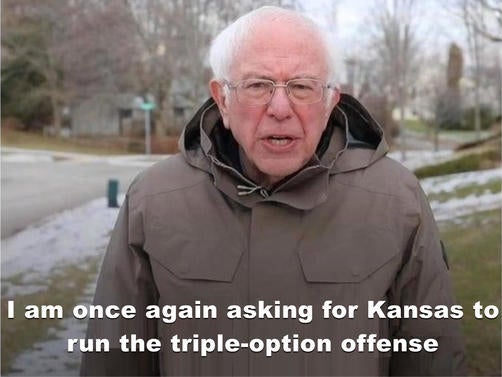
Kansas is not the only school I've asked to consider this option over the years. Hell, just this past November, I wrote that Vanderbilt should do it. Instead, Vandy opted for Notre Dame defensive coordinator and former Commodore Clark Lea. As an act of revenge for my suggestion that Vandy should run the option at his alma mater, Lea stole my friend and Cover 3 Podcast co-host away from me. In 2017, I wrote that Oregon State should run it too. This is not a new idea to me! Instead, it's one I've only become more convinced by as I've watched programs fail repeatedly, and the spread become even more prevalent in the sport.
My theory has always been simple: if you're not one of the elite college football programs in the country, you will have a difficult time winning games the same way everybody else does. Particularly, when you're a school with either more stringent academic requirements or a school located in an area of the country without a lot of local football talent.
Kansas is a perfect example of a school that needs to run the option. Kansas has plenty of junior college talent, but it's tough to win consistently going the juco route. The high school scene lacks top-end talent in most years. Though it sends plenty of players to Power Five and FBS schools, Kansas has produced only 19 four-star recruits since the 2010 recruiting class. The state of Georgia currently has 34 recruits rated four stars or higher in the 2022 recruiting class alone. Of those 19 four-stars the state of Kansas has produced, only one opted to go to Lawrence.
Kansas needs to use the talent available and then mine Texas, Florida and other hotbeds for overlooked gems and fits for its style. And that style needs to be the option because it would give the Jayhawks a different look compared to what everybody else in the Big 12 runs.
We've already seen this in Lawrence. Mangino came to Kansas after spending two seasons as the offensive coordinator at Oklahoma. As a part of Bob Stoops' staff at Oklahoma, Mangino, who began as the offensive line coach in 1999 while Mike Leach was the OC, ran an Air Raid offense. This was back before the Air Raid had become prevalent, even in the Big 12. It was the same Air Raid offense Leach ran at Kentucky that suddenly made the Wildcats viable in the SEC (and produced a No. 1 pick in the NFL Draft in Tim Couch). The same offense that took Oklahoma from 5-6 in John Blake's final season of 1998 to a national title in Stoops' second season, and Mangino's first as the offensive coordinator. Mangino brought that offense to Kansas and, after going 2-10 in his first season, went 46-38 over the next seven, including a 12-1 record in 2007 that saw freaking Kansas win the Orange Bowl.
Kansas has been trying to rekindle that magic ever since, and it's done so by thinking it can keep running the same kind of offense almost everybody else in the Big 12 is now running, but it can't. You can't run the same scheme as everybody you play when they have more talent than you do. Very few coaches can out-scheme an opponent well enough on gameday to overcome that obvious disadvantage, and the ones that do exist (if they actually do) aren't interested in the Kansas job.
Instead, Kansas needs to use the same line of thinking that led to Mangino, but on the other end of the spectrum. Run the option, Kansas. I don't know if it will lead to another Orange Bowl win, but it would help give your football program a solid foundation. It would give it an identity. Those are two things it doesn't have right now.
Want more college football in your life? Listen below and subscribe to the Cover 3 College Football podcast for top-notch insight and analysis beyond the gridiron.
Growing discontent in the Big Ten
Earlier this week, Illinois athletic director Josh Whitman released an open letter to Illinois fans about the basketball program. In that letter, Whitman explained how he had asked the Big Ten to reconsider naming Michigan the conference's regular-season champion based on the rules the conference agreed to before the season. Those rules were pretty clear: in the wake of COVID-19 canceling games, the team with the highest winning percentage in the Big Ten would be named the regular-season champion.
Michigan played only 17 conference games compared to Illinois' 20. The Wolverines went 14-3, while the Illini went 16-4. Michigan's win percentage of .824 gave it the title, but Whitman argued that Illinois was being punished for being able to play more games. Whitman said that since Illinois had won two more games than Michigan (one of which was a 76-53 win over the Wolverines in Ann Arbor), the conference should name the schools co-champions. The argument also centered around the fact that the Big Ten had changed its preseason requirements in football to allow Ohio State to play in the Big Ten Championship Game just a few months ago.
The Big Ten said no to Illinois. Now, I do not care about the decision or figuring out who is right and who is wrong. What interests me is that Whitman would go public with this. He's the latest member of a Big Ten athletic department to take his grievances with new Big Ten commissioner Kevin Warren public, as we saw Nebraska and Ohio State do during the fall when the conference decided to postpone its football season.
I'm trying to think of all the times Big Ten administrators publicly questioned Jim Delany during his tenure as Big Ten commissioner and coming up empty. Don't get me wrong, there were gripes, but nobody was willing to attach their name to them publicly. They definitely weren't willing to release open letters about them!
There have been plenty of private grumblings from Big Ten athletic departments about what's seen as a lack of communication between them and Warren since he took over, as well. And about the decisions he's made.
I'm not sure how fair they all are, especially considering Warren stepped into a seemingly impossible situation during his first year as commissioner. What I do know is you don't usually get a second chance to make a first impression, and it doesn't seem like Warren's first impression has gone over very well.
Good luck to Bob Stoops
Fox announced this week that former Oklahoma coach Bob Stoops is the network's replacement for Urban Meyer as a studio analyst, and I think that's a good decision by the network. Stoops has always been an interesting, charismatic character, and I think he'll do very well on television.
That said, I'll still miss Meyer. Whatever you think of him, Meyer has an excellent football mind, and whether it was just by sharing his thoughts at the desk or in special segments for Fox and the Big Ten Network breaking down film, I always learned something while watching. I wish we'd get more of that in college football television, rather than just debating over which team is the real No. 4 team in mid-October.





